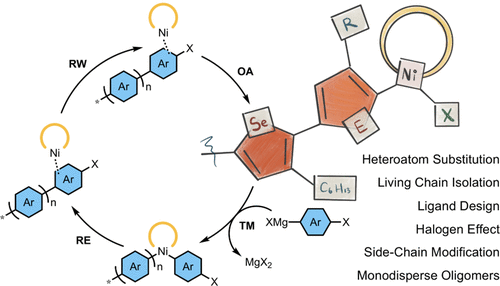当前位置:
X-MOL 学术
›
Acc. Chem. Res.
›
论文详情
Our official English website, www.x-mol.net, welcomes your feedback! (Note: you will need to create a separate account there.)
Precision Synthesis of Conjugated Polymers Using the Kumada Methodology
Accounts of Chemical Research ( IF 18.3 ) Pub Date : 2021-11-02 , DOI: 10.1021/acs.accounts.1c00556 Susan Cheng 1 , Ruyan Zhao 1 , Dwight S Seferos 1, 2
Accounts of Chemical Research ( IF 18.3 ) Pub Date : 2021-11-02 , DOI: 10.1021/acs.accounts.1c00556 Susan Cheng 1 , Ruyan Zhao 1 , Dwight S Seferos 1, 2
Affiliation

|
Since the discovery of conductive poly(acetylene), the study of conjugated polymers has remained an active and interdisciplinary frontier between polymer chemistry, polymer physics, computation, and device engineering. One of the ultimate goals of polymer science is to reliably synthesize structures, similar to small molecule synthesis. Kumada catalyst-transfer polymerization (KCTP) is a powerful tool for synthesizing conjugated polymers with predictable molecular weights, narrow dispersities, specific end groups, and complex backbone architectures. However, expanding the monomer scope beyond the well-studied 3-alkylthiophenes to include electron-deficient and complex heterocycles has been difficult. Revisiting the successful applications of KCTP can help us gain new insight into the CTP mechanisms and thus inspire breakthroughs in the controlled polymerization of challenging π-conjugated monomers.
中文翻译:

使用 Kumada 方法精确合成共轭聚合物
自从发现导电聚(乙炔)以来,共轭聚合物的研究一直是聚合物化学、聚合物物理、计算和器件工程之间活跃的跨学科前沿。聚合物科学的最终目标之一是可靠地合成结构,类似于小分子合成。Kumada 催化剂转移聚合 (KCTP) 是合成具有可预测分子量、窄分散性、特定端基和复杂骨架结构的共轭聚合物的有力工具。然而,将单体范围扩展到经过充分研究的 3-烷基噻吩以包括缺电子和复杂的杂环一直很困难。
更新日期:2021-11-16
中文翻译:

使用 Kumada 方法精确合成共轭聚合物
自从发现导电聚(乙炔)以来,共轭聚合物的研究一直是聚合物化学、聚合物物理、计算和器件工程之间活跃的跨学科前沿。聚合物科学的最终目标之一是可靠地合成结构,类似于小分子合成。Kumada 催化剂转移聚合 (KCTP) 是合成具有可预测分子量、窄分散性、特定端基和复杂骨架结构的共轭聚合物的有力工具。然而,将单体范围扩展到经过充分研究的 3-烷基噻吩以包括缺电子和复杂的杂环一直很困难。


























 京公网安备 11010802027423号
京公网安备 11010802027423号